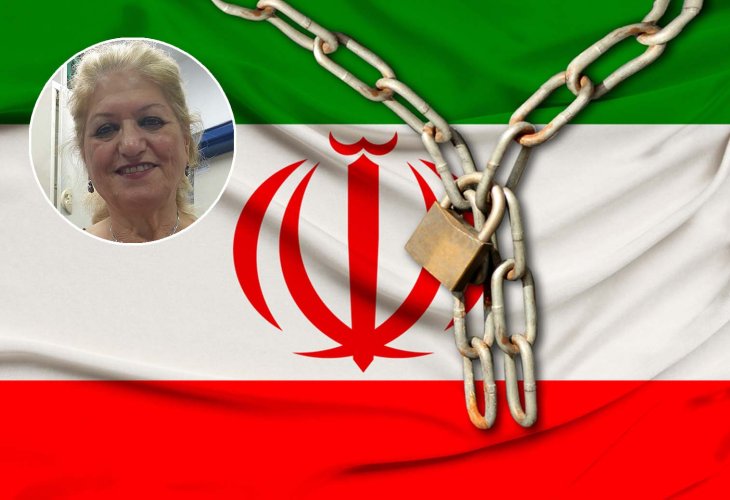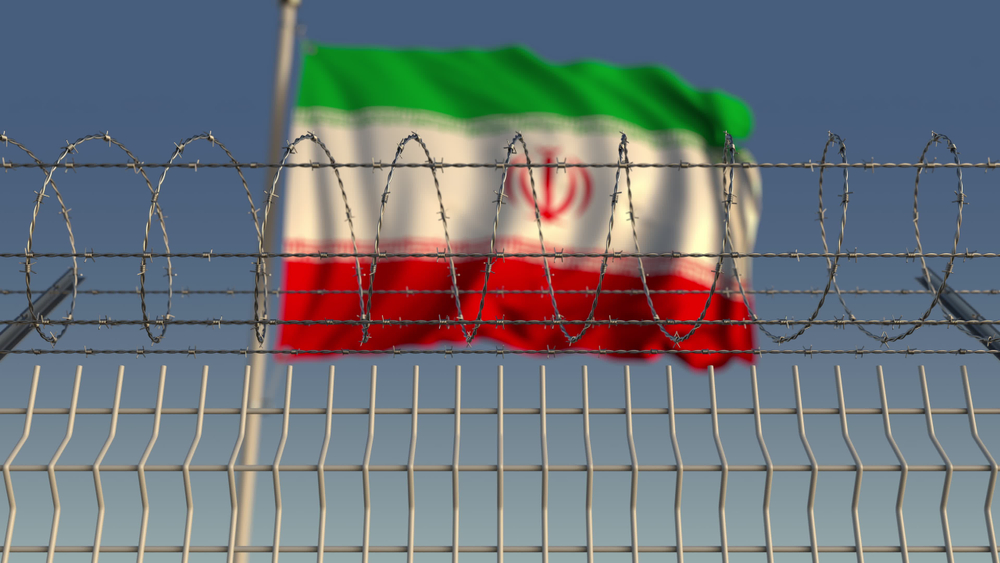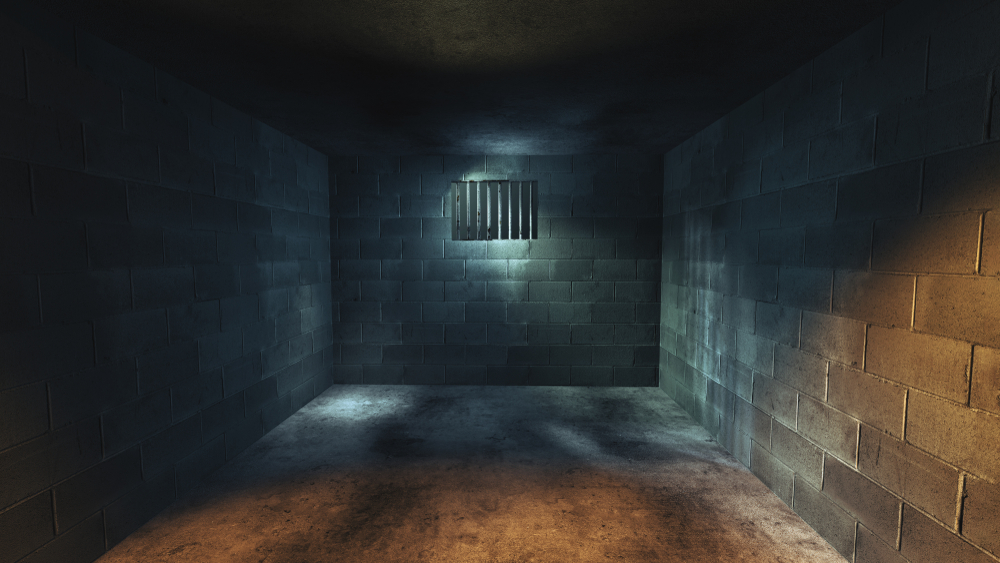"Just Before Escaping, We Were Caught by the Iranian Regime and Imprisoned in a Dungeon": The Harrowing Story of Eti Zionit
Like other Jews in Iran, Eti Zionit's life was turned upside down with the outbreak of the Islamic Revolution in Iran. She tried to help Iranian Jews escape and also intended to immigrate to Israel herself, but then a series of terrifying events unfolded showing her firsthand the divine providence.
 In the circle: Eti Zionit (photo: shutterstock)
In the circle: Eti Zionit (photo: shutterstock)When meeting Eti Zionit, a 72-year-old resident of Petah Tikva, one cannot imagine at first glance the arduous journey she took from Iran to Israel. After the Islamic Revolution in Iran, Eti and her husband tried to escape the republic, but they did not leave behind community members. Amidst significant danger, Eti stamped their passports with government seals, which she took from the Iranian Ministry of Finance. They were caught, imprisoned, and tortured for a long time - but did not break. A mighty contemporary Jewish heroism.
In childhood, Eti grew up in the famous Iranian city of Tusarkan, also considered Iran's 'nut capital' for its renowned trading houses that sell nuts all over the republic. "My hometown holds a different - much more important - significance for us - the Jewish people," she says. "In Tusarkan is the tomb of Habakkuk the Prophet, considered a pilgrimage site for Iranian Jews, but also for local Muslims."
In those years, the Jews of the place lived in peace. At that time, the Shah ruled Iran, a gracious leader who was close to the State of Israel and the Jewish people and listened to requests from Iranian Jews. "Even our small community thrived thanks to this," says Zionit, "It was a community that diligently kept the tradition and the commandments of the religion." After completing her studies, she settled with a member of the local Jewish community, and they had two children. During that time, she began to show interest in immigrating to Israel. "In pursuit of my aspiration to move to Israel, I came for a visit during that time." However, life in Iran drew her back, and Zionit struggled to leave her homeland at that time.
Darkening Skies
During the Persian 'Golden Age', nothing seemed to cloud the serenity of Zionit and other Iranian Jews, until massive demonstrations erupted across the republic, signaling the first crack in the iron grip of the Iranian regime. Tens of thousands of people protested daily against the Shah's regime, and if that wasn't enough, the USA - the long-standing ally of the Iranian leader - turned its back and forced him to flee the country, leaving it in the hands of extremist revolutionaries.
"When the revolution happened, I held a senior position in the Iranian Ministry of Finance. This granted me access to important files, including confidential documents." During the early days of the coup, in the midst of continuous instability, the prime ministers changed several times. At some point, Mohammad Ali Rajai was appointed prime minister. Rajai was considered extreme in his attitude towards Israel and the West; he was also known for his hatred of Jews. The new prime minister, who would later be assassinated by the Iranian opposition, decided to alienate the Jews. "In a special letter that reached me, I discovered that Rajai requested all government entities in Iran to prohibit Jews from leaving Iran. As soon as the directive came to me, I decided to act. I went home and, with my husband, agreed to flee the country."
 (photo: shutterstock)
(photo: shutterstock)How do you plan to escape a country where you have lived your entire life?
"It is a very difficult decision. To ease it, I came to Israel alone to get a final impression and prepare the ground for aliyah. When I returned to Iran, I discovered that the revolution had already become a reality. My passport was thoroughly checked upon entry by airport security, and luckily, miraculously, I was allowed in without stirring any unnecessary issues."
Fear and Terror in the Streets
Eti returned to a country overcome with fear and terror. "Massive demonstrations still took place in the streets, and gunshots were heard all around," she recounts. There was a deep fear of leaving homes, and often I did not know if I would return home when I left. Even food was scarce. Sanctions imposed by Western countries on Iran after the revolutionaries took over led to huge lines at food stores from citizens seeking to purchase essentials like bread and milk."
If the chaos that ensued in Iran since the revolution broke out wasn't enough - the war that opened between Iran and Iraq rendered the republic an unbearable place to live. "In the Jewish community, there was a grave fear of young people being drafted into battle. We knew many of those going to fight would not return. At that time, several rabbis were working to rescue Jews from Iran. They managed an entire escape network that led many Jews out of the country. For the young people, it was a rescue from almost certain death on the battlefields. However, the escape operations carried risks, and there were Jews from Iran who died in the dangerous escape journey, but it was preferable to certain death on the Iraqi border."
At this point, Zionit also decided to flee, but she prepared her escape operation in a much more sophisticated way. "We decided not to escape through a dangerous escape journey, but to leave the country through legitimate means."
But that contradicted the decree that forbade Iranian Jews from leaving the country by regular means?
"Indeed, at that time, it was difficult for Jews to leave. But what about Muslims? They, of course, could escape without any problem. So, to escape, we understood that we had to appear as Muslims." For this purpose, Zionit and her husband had to hold Muslim identification documents, which differed from those given to other ethnicities. Additionally, they obtained a Basij booklet – the revolutionary loyalty body. "The Basij booklet," Zionit explains, "was meant to determine who is for the revolutionary regime and who is against it. So much so, that the Iranian regime operated according to this booklet, even vendors would stamp Basij booklets."
Obtaining the booklet was very complicated, and Zionit used her access to the secret corridors of the Iranian regime in the Ministry of Finance. "First, we purchased documents from Muslims for large sums of money, and then we replaced the names with ours, as I used the seals from the Ministry of Finance - which I had access to - to stamp the new documents with government seals." Next, Zionit sent the documents to the Ministry of Interior, and within two weeks of obtaining the Muslim documents - she and her husband had passports. The way to freedom was paved.
"For understanding," she says, "previously, we tried for 4 years to obtain a passport and didn't get it because we were Jews. From the moment we 'became Muslims' everything became easier"...
Zionit and her husband established an impressive smuggling network, through which dozens of Jews escaped from Iran, with Zionit repeatedly stamping escapees' documents with seals from the Ministry of Finance. "As part of this, we also smuggled out my husband's mother and brother from the country. We couldn't escape and leave them behind."
One woman who left Iran thanks to Zionit's activities was a young girl, who after her escape, decided in an inexplicable step to bring her jewelry out of Iran as well. For this, she contacted a local smuggler and disclosed the entire story. Unfortunately, the 'smuggler' was actually an agent of the Iranian regime. He quickly sent the information to the corridors of the Iranian authorities, and Zionit was exposed instantly.
"One night, there were loud knocks on my door," she recalls. "12 individuals in civilian clothes burst into our home with drawn guns. They blindfolded me and my husband and did not allow us even to call someone to come to take our young children, who were left home alone. Also, the heating in the house, powered by oil, was left burning. The armed intruders wouldn't allow us to extinguish the lamp despite the safety concerns of the place. Humanity was not the strong suit of the regime's people, then as now."
What was your feeling at those moments?
"I believed I was going to die. My husband and I recited 'Sh'ma Yisrael', and we understood our end had come. Even now, when I tell this, I feel chills." The regime officials tried to conceal their suspicions from the couple. "They told us, 'just come for a couple of hours of interrogation, and we'll release you afterward'."
Zionit and her husband were separated upon their arrest, and each was thrown into a different prison. They were not given food or water for the first hours of their detention. From the temporary prisons, they were taken to Evin Prison, infamous among Iranian citizens. "In Evin Prison, we suffered severe humiliations and tortures, in addition to enduring antisemitism seasoned with harsh remarks against the Jewish people. The investigators repeatedly accused me: 'You deceived the Iranian regime, now you will pay dearly for it!', or: 'Who are you to cheat the Islamic Republic?'. But I wrapped myself in my Islamic image and insisted I was Muslim. The investigators tried to force me to admit that I wasn't Muslim. At one point, they locked me in solitary and beat me with a leather whip. The blows were unbearable, and I fainted. After regaining consciousness, the interrogations and tortures continued.
"Throughout that period, I strengthened my faith and prayed to Hashem to rescue me from this terrible place. I also pleaded for the rabbis who collaborated with us not to be caught, and that my husband wouldn't confess to their involvement or break down and admit that we smuggled others out of Iran. My prayer was answered."
Throughout the investigation, the couple continued insisting they were indeed Muslim. "We had a Muslim marriage certificate at home, which we made sure to forge in advance to deceive the Iranian authorities. However, the investigators wanted to ensure definitively that I was truly Muslim and not Jewish. I continuously denied the accusations of being Jewish. But the investigators remained suspicious. Therefore, they decided to summon a Muslim cleric to verify if we were truly Muslims."
Remarkably, Zionit passed the test successfully. Because of this, the investigators were embarrassed and decided to imprison her in solitary. "It was the hardest period of my life," she recalls. "I was confined for a whole month without any conditions. Food was thrown towards me through the door, half-spilled along the way. Throughout those days, I diligently counted the days until Passover, when I refrained from eating anything other than a bit of the porridge sent to me - to stay alive. After a month, I was exhausted. Then, I turned to Hashem and pleaded, 'enough is enough'. While praying, I cried and fainted. When I awoke, I heard the door opening. The guards approached me and said, 'Collect your things and leave'. Hashem heard my prayer."
 (Photo Illustration: shutterstock)
(Photo Illustration: shutterstock)"I went outside and felt the sun shining on my face after an entire month without seeing daylight. I recited the Sh'ma with emotion, and returned home with my husband."
The couple was released on large bail for a short period until their trial. They returned home and found their children healthy and safe, living with family members until then. At this point, they decided to escape Iran immediately. Yet, their hardship continued. A fraudulent smuggler took all their money and disappeared without a trace, leaving them broken, battered, and impoverished, while the threat of re-imprisonment loomed over them.
Meanwhile, the trial approached, and Zionit and her husband were sentenced to an additional half-year imprisonment. The couple decided at any cost not to return to Iranian prison and went underground, while their relatives gathered money to help them escape the country. Once the money was assembled, Zionit, learning from past experiences, paid the smuggler only half the sum initially, promising him the remainder upon completing the escape operation.
Afghanistan – Pakistan – Switzerland – and the Promised Land
One moonless night, the couple and their children, along with the smuggler, set out in an old pickup truck. The truck rumbled through the desert surrounding Iran for many hours. "We traversed almost 200 km/h in a continuous drive," she says. "We couldn't see anything around us, but thanks to this, we escaped Iranian patrols and local trackers." Only the biting cold struck them along the journey.
The journey that began deep inside Iran ended in neighboring Afghanistan. From there, the family continued to Pakistan, where they received official UN refugee documents. For two weeks, they awaited in the Arab country, abstaining from all non-kosher food and surviving on fruits and vegetables. Upon concluding their stay in the Arab states, they were informed by the Jewish Agency that they would be airlifted to Switzerland, and from there, finally, to the promised land - Israel. Upon arrival, they were received by representatives of Iranian Jewry, initially housed in a hotel in central Israel, and later moved to live in Petah Tikva alongside her relatives who had arrived earlier.
Today, Zionit is a matriarch with a large family, sons and daughters, grandchildren who participate in the fight against Iran in senior positions. She is an author of three gripping books, the latest "The Plot", published by Steimatzky. In one of her books, "Red Apple", she recounts her breath-taking escape story. Meanwhile, she finds time to volunteer at the David's Help Association in Holon, which assists the needy.
Eti Zionit's email: seasionit@walla.co.il

